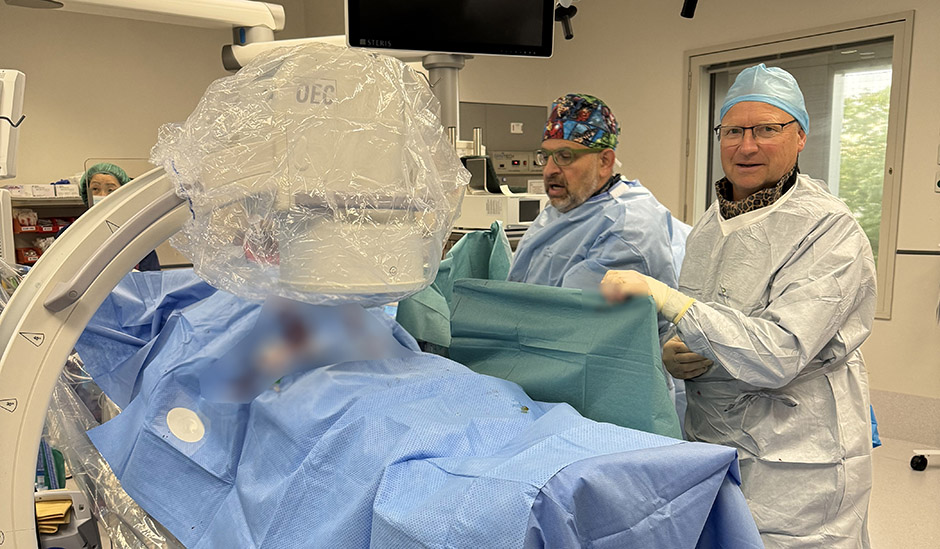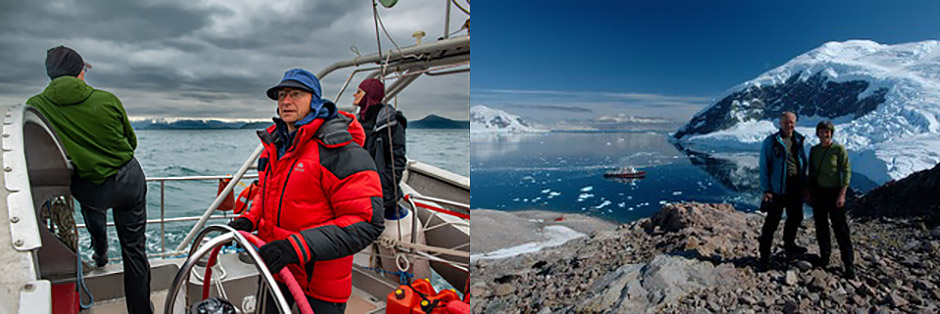It was William Osler (1849–1919), a Professor of Medicine at John Hopkins Medical School, who famously noted the links between medicine and art. The artist’s ability to see fine detail, through patient, precise, and controlled thought and movement has indeed been a hallmark of Professor Justin Roake’s distinguished career as both a Vascular and Transplant surgeon, and amateur wildlife/astro photographer and author.
Professor Roake retired late last year after an esteemed, decades-long career as Professor of Surgery at the University of Otago, Christchurch, providing outstanding service to the University and Canterbury community in teaching, research, and dedicated public health practice.
“I have been incredibly fortunate to have the career I’ve had, advancing transplant and vascular services for the public good, working with colleagues I admire and respect, as well as passing the torch to the next generation of surgeons, who will go on to forge meaningful careers,” Professor Roake says.
His retirement from university teaching and public hospital surgical work has been, he admits, more premature than he would have liked – hastened by neuropathic pain in his neck causing debilitating weakness in his ‘surgical’ right arm and hand – brought on he suspects by the occupational hazards of surgery.
“Perhaps we surgeons are too focussed on the job, not realising the strain and posture damage we may be inflicting on ourselves by repetitively leaning over patients in theatre.
“It’s a big issue for surgeons worldwide yet one we need to take more seriously. We may need to explore new ways of positioning and placing ourselves and patients in theatre,” Professor Roake suggests.

Professor Justin Roake (right) operating at Christchurch Public Hospital.
Born in Christchurch, Professor Roake went to school in the UK (where his father was based for anaesthetic specialist training) then back home, at Christchurch Boys High School. Gaining acceptance to Otago Medical School, Professor Roake returned from Dunedin to make up the 1976 4th year cohort at the Christchurch School of Medicine, a mere 3 years after it was formed.
After completing his surgical fellowship in Christchurch in 1988, he was awarded a Girdlers' Company Junior Research Fellowship and the Nuffield Medical Research Fellowship for study in Oxford in the UK. He was the Oxford Fellow in Transplantation in 1989 and then undertook full-time research for a DPhil in transplantation immunology with a focus on dendritic cell biology.
“In our first year in Oxford, at the Oxford Transplant Unit, we lived in a small flat at the Churchill Hospital, and I was on-call every single night, which, looking back, was tough on my wife Nicola and our three small children.
“Towards the end of my research studies, I was offered a position as a consultant vascular and transplant surgeon, with substantially improved conditions, being on-call only every second night.
“As there were no suitable openings for surgical jobs back in New Zealand, I remained in Oxford for a further 5 years until a position became available,” he says.
Professor Roake says making progress in the NHS at that time was very hard.
“It was such a behemoth of an organisation, but I believed that back in New Zealand I might be able to have influence on a national scale in transplantation and also in the area of organ donation, which relies on much collaboration and consistency.”
He returned to Christchurch to take up the Chair of Surgery and Head of the Department of Surgery at the Christchurch School of Medicine (1997-2008). However, he admits when he first started some “righting of the ship” was required.
“When I arrived, I was presented with a cardboard box and told, ‘this is the Department of Surgery, here’s your office, the phones are off, and by the way, you need to organise surgical examinations for the trainee interns next week,’” he recalls.
He went on to establish the Vascular Surgery Department and was its inaugural clinical director from 2007–2017 – an achievement he is proud of.
“There was a huge amount of work involved, including working with the Ministry of Health on the blueprint for vascular services in New Zealand,” he says.
“It’s still not fully implemented, but absolutely needs to be.”
He credits the positive influence of Professor John Morton for his interest and involvement in transplantation.
“The way he communicated with people left a great impression on me as a student,” Professor Roake says.
“I learned that you see people for life in the transplant area of medicine and you get to know them well, due to the fact that kidney patients are in the health system for life. I was able to enjoy more of a relationship with patients over time and found being able to provide them with a solution was so rewarding.”
Professor Roake also experienced a coincidental set of circumstances which contributed to his dedication to transplant surgery. His father, Dr Hamish Roake, and his aunt (Hamish’s sister), Dr Margaret Cummack, were the two anaesthetists who jointly assisted the very first kidney transplant procedures in Christchurch in the early 1970s. Two kidneys were available from one donor, and his father was the anaesthetist for one transplant operation in one theatre, while his aunt was in the theatre next door helping with the other.
“Ironically, my father later experienced kidney failure, with Professor Morton carrying out his transplant procedure in 1983,” he recalls.
Professor Roake served as Deputy Dean of the Christchurch School of Medicine from 2007 to 2009, was Chair of the Vascular Society of New Zealand (2013–2021), also serving in roles with the Ministry of Health, the Royal Australasian College of Surgeons New Zealand National Board, the Australia New Zealand Society for Vascular Surgery Audit Committee, the National Renal Transplant Leadership Team – Strategic and Operational groups, to name but a few.
In delivering vascular teaching to 4th year and trainee intern students, Professor Roake has been a well-respected teacher over a long period at the Christchurch campus.
His research interests have focussed on clinical studies into aortic aneurysms, and he has campaigned doggedly with the health ministry to justify a national screening programme for aortic aneurysm.
“The National Screening Advisory Committee recognises its value, we’ve made the case for its efficacy, so I’m hopeful we will see it progressed,” he enthuses.
He’s pleased to have seen the Department of Surgery go from strength to strength over the years but holds concerns for current resourcing of surgery in the public system locally.
“Succession planning is now well in hand for vascular surgery with Oliver Lyons and Ruth Benson stepping forward as the new generation and future of vascular surgery here in Canterbury, but I’d like to see the transplant service a little more secure from the surgery side of things.
“Resourcing remains tentative,” he laments.

Left: Justin Roake sailing in Aleutian Islands, 2019. Right: Justin and Nicola in Antarctica, 2007.
Retirement for the “very proud” proud father of three (he has a son who is a musician/producer, and two daughters – one an architect and another a horticulturalist and pre-school teacher), and grandfather of 6, will allow him more time for the hobbies which fulfil him.
A keen wildlife- and astro-photographer, he and wife Nicola (a celebrated silversmith) have enjoyed many interesting, varied and adventurous trips with photographic opportunities, including the Antarctic, Africa, the Amazon, Galapagos Islands, Myanmar, Alaskan Coast and the Aleutian Islands and, most recently, the Arctic. He has his own observatory at the family bach at Lake Alexandrina near Tekapo to indulge his passion for the stars and astrophotography.
He also writes books, mostly about his travels, which are illustrated with his own photography. He is currently writing a book documenting the couple’s recent trip to Namibia and Ethiopia.
“The books are mainly for the grandchildren so they can read more about our lives, beliefs and motivations,” he says.
Current Head of the Department of Surgery, Professor Tim Eglinton, says Professor Roake will be greatly missed.
“Justin was a gifted academic and surgeon, respected by his students, peers and patients alike,” Professor Eglinton says.
“His contributions, throughout a long and distinguished career, made a real difference and leave a legacy from which the University, health system and community as a whole will benefit for many years to come”.